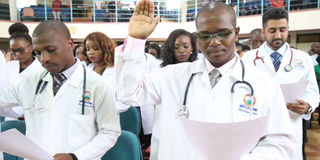What institutions can do to boost human resources for health

Kenya Methodist University medical graduands class of 2011-2017 taking oath. PHOTO| PHOEBE OKALL
A strong health system needs adequate and quality healthcare workers. In Kenya, the gap towards achieving the standards set by the World Health Organisation remains significant, with many patients unable to access quality healthcare services, particularly in rural areas.
Although universities have increased admissions to training programmes, the infrastructure and human resources in the universities have not grown in tandem with the growth of the student body, resulting in diminishing opportunities for hands-on exposure required for effective pre-service medical training.
Further, new training programmes have been introduced to meet specific needs of pre-service and post-service training for health workers and other personnel in the health sector.
Kenya has adopted many approaches towards addressing these needs, but resources have remained a challenge and opportunities for increasing the number and quality of staff working in county health facilities are needed to meet county-specific needs.
The University of Nairobi, the oldest institution of higher learning in Kenya, has made a significant contribution towards boosting human resources for health, that other medical institutions can learn from. These efforts include:
Decentralisation of medical training: As student numbers continued to swell, creating a strain on the training environment and resources available at the Kenyatta National Referral Hospital, the university expanded practical sections to other facilities across the country to enable trainees acquire critical practical skills adequately and without restriction.
Flexible learning to retain workers in their duty stations:By extending training opportunities to healthcare workers in all areas in Kenya through open/distance and e-learning, health workers have been able to access training while continuing to offer much needed clinical services to the population, where they are most needed.
Clinical research: Due to the dynamic nature of the health sector and the emerging and re-emerging diseases, there is need to continue investing in research to have capacity to address emerging health needs. Universities conduct high-level research led by local scholars who collaborate with local and international partners, and contribute significantly to building the capacity of faculty and health workers across the country.
Orphaned skill sets: While it is critical that health workers attain world-class clinical training, the need to equip them with other skills necessary for proper functioning of the health system is largely ignored. Several training programmes have been set up to offer skills in health programme management, communication and technology, monitoring and evaluation, health economics, epidemiology and biostatistics, among others.
These are offered at various levels of complexity to suit the needs of all cadres of personnel.
Institutional capacity building: By partnering with local organisations implementing health programmes, capacity gaps in health systems of these organisations are determined. They can be bridged by collaboratively implementing collective measures. This in turn means that the organisations are better able to support the personnel working for them to provide better services to the populations they serve.
Significant effort has been made towards strengthening health systems in Kenya, but a lot more needs to be done at the national and county level, and even in the private sector. There is need to mobilise and ring-fence resources to sustainably address challenges faced by personnel working in the health sector.
Prof M'imunya is the Principal, College of Health Sciences, University of Nairobi.


